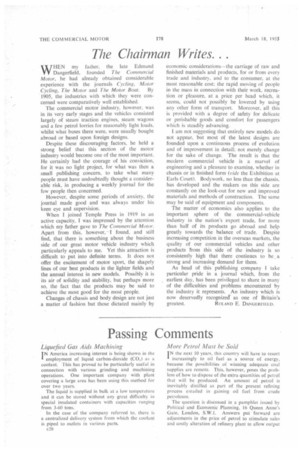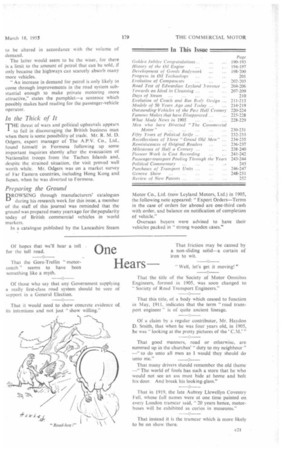Passing Comments
Page 78

Page 79

If you've noticed an error in this article please click here to report it so we can fix it.
Liquefied Gas Aids Machining
IN America increasing interest is being shown in the employment of liquid carbon-dioxide (COO) as a coolant This has proved to be particularly useful in connection with various grinding and machining operations. One important company with plant covering a large area has been using this method for over two years.
The liquid is supplied in bulk at a low temperature and it can be stored without any great difficulty in special insulated containers with capacities ranging from 3-60 tons.
In the case of the company referred to. there is a centralized delivery system from which the coolant is piped to outlets in various parts.
c20
More Petrol Must he Sold
I N the next 10 years, this country will have to resort increasingly to oil fuel as a source of energy, because the possibilities of winning adequate coal supplies are remote. This, however, poses the problem of how to dispose of the extra quantities of petrol that will be produced. An amount of petrol is inevitably distilled as part of the present refining process entailed in gaining oil fuel from crude petroleum.
The question is discussed in a pamphlet issued by Political and Economic Planning, 16 Queen Anne's Gate, London, &WA_ Answers put forward are adjustments in the price of petrol to stimulate sales and costly alteration of refinery plant to allow output to be altered in accordance with the volume of demand.
The latter would seem to be the wiser, for there is a limit to the amount of petrol that can be sold, if only because the highways can scarcely absorb many more vehicles.
An increase in demand for petrol is only likely to come through improvements in the road system substantial enough to make private motoring more attractive," states the pamphlet—a sentence which possibly makes hard reading for the passenger-vehicle operator.
In the Thick of It
THE threat of wars and political upheavals appears to fail in discouraging the British business man when there is some possibility of trade. Mr. R. M. D. Odgers, export manager of The A.P.V. Co., Ltd., found himself in Formosa following up some important inquiries shortly after the evacuation of Nationalist troops from the Tachen Islands and, despite the strained situation, the visit proved well worth while. Mr. Odgers was on a market survey of Far Eastern countries, including Hong Kong and Japan, when he was diverted to Formosa.
Preparing the Ground BROWSING through manufacturers' catalogues during his research work for this issue, a member of the staff of this journal was reminded that the ground was prepared many years ago for the popularity today of British commercial vehicles in world markets_
In a catalogue published by the Lancashire Steam Motor Co., Ltd. (now Leyland Motors, Ltd.) in 1905, the following note appeared: "Export Orders—Terms in the case of orders for abroad are one-third cash with order, and balance on notification of completion of vehicle."
Overseas buyers were advised to have their vehicles packed in strong wooden cases."








































































































































































































































































